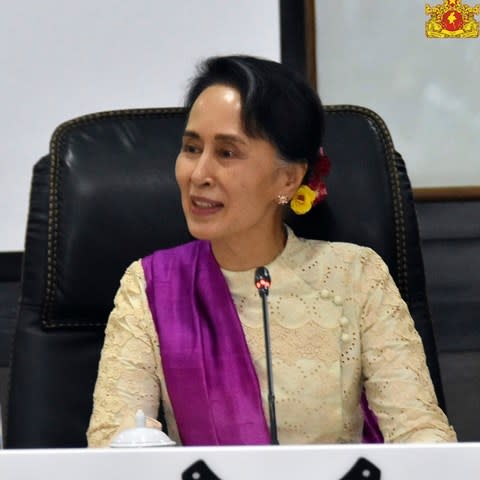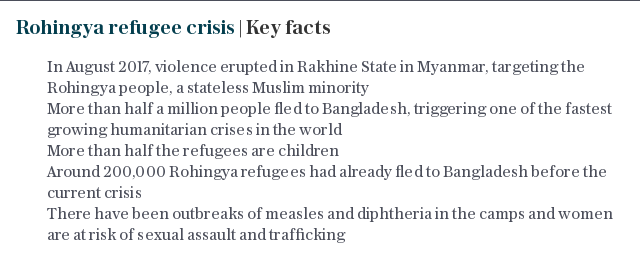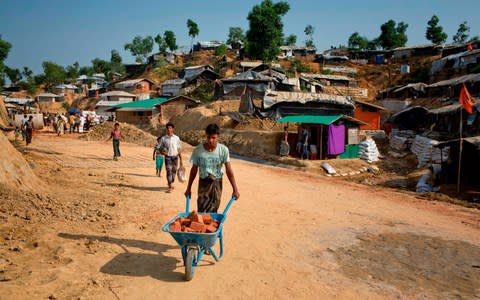MPs recommends Burma be referred to International Criminal Court for Rohingya ethnic cleansing

British MPs have called for the Burmese regime to be referred to the international criminal court over evidence of state-sanctioned ethnic cleansing against the country’s Rohingya Muslim minority.
In a report published on Tuesday, the House of Commons international development committee called for “major changes” in Britain’s dealings with Burma in the light of recent atrocities, including a complete review of the UK’s £100m aid budget to Aung San Suu Kyi’s government.
“British taxpayers must be assured that their money is not being used to subsidise a government accused of crimes against humanity,” said Stephen Twigg, the Labour MP who chairs the committee.
“Burma must realise there is a bill to pay for the actions of the Burmese army and the inaction of Burmese government and society. The dramatic changes to the situation in Burma must drive dramatic changes in UK policy.”
The committee was barred from entering Burma earlier this year to check up on UK aid projects after it criticised a violent military crackdown on the Rohingya minority that has caused close to 700,000 to flee their homes since last August.

Many of those who took refuge in neighbouring Bangladesh have told of massacres, rape and arson at the hands of soldiers, who they claimed even threw small babies into open fires.
The committee’s plea for the UK and its allies to apply targeted sanctions against key figures and to gather support on taking Burma to the ICC follows an attempt by the court’s prosecutor, Fatou Bensouda, to secure jurisdiction over the Southeast Asian nation, even though it is not a signatory.
Earlier this month, the Hague-based ICC asked Bangladesh, which does fall under its remit, to weigh in on a request by Ms Bensouda to take action over alleged deportations of Rohingya Muslims across the border.
However, the push for collective action on Burma has been hampered at the United Nations by opposition from China, a veto-wielding Security Council member.
Burma has expressed “serious concern” about the prosecutor’s efforts, with government spokesman Zaw Htay claiming that the ICC “cannot take action.”
The brutal military operation was initially sparked by attacks by Rohingya insurgents, known as the Arakan Rohingya Salvation Army (ARSA), on security posts in Burma’s western Rakhine state in late August.
But ARSA did not only target the military. Militants also massacred up to 99 Hindu men, women and children, according to a disturbing new report released on Tuesday by human rights group Amnesty International.
Eyewitnesses to the killing and abduction of Hindu villagers last August told investigators in Rakhine and Bangladesh that an armed Rohingya group, attacked them with swords and guns.
It is unclear why Burma’s tiny Hindu minority – which makes up just 0.5 per cent of the population – was singled out, and earlier government claims of the heinous crimes were denied by ARSA.

However, according to Amnesty’s evidence, ARSA fighters entered the village of Ah Nauk Kha Maung Seik at 8am on August 25, robbed and bound villagers and marched 53 of them off to be executed.
Eight women and eight of their children were spared after they agreed to convert to Islam. Survivor Bina Bala, 22, told Amnesty that one of the militants told her: “You and Rakhine are the same, you have a different religion, you can’t live here.”
Eight survivors said they either saw Hindu relatives being killed or they heard their screams. “They slaughtered the men…They had knives. They also had some spades and iron rods… My uncle, my father, my brother – they were all slaughtered,” said Raj Kumari, 18.
Formila, 20, said she had seen ARSA fighters kill women and children. “I saw men holding the heads and hair [of the women] and others were holding knives. And then they cut their throats,” she said.

According to a detailed list of the dead, 20 were men, ten were women and 23 were children, 14 of whom were under eight.
The same day, 46 Hindu men from the neighbouring village of Ye Bauk Kyar disappeared. Their community believes they were killed by the same militants.
Tirana Hassan, Amnesty’s crisis response director said that accountability was crucial both for ARSA’s atrocities as well as for “the crimes against humanity” carried out by Burmese security forces.
“ARSA’s appalling attacks were followed by the Myanmar military’s ethnic cleansing campaign against the Rohingya population as a whole. Both must be condemned – human rights violations by one side never justify abuses or violations by the other,” she said.
“All the survivors and victims’ families have the right to justice, truth and reparation for the immense harm they have suffered.”

 Yahoo News
Yahoo News 
